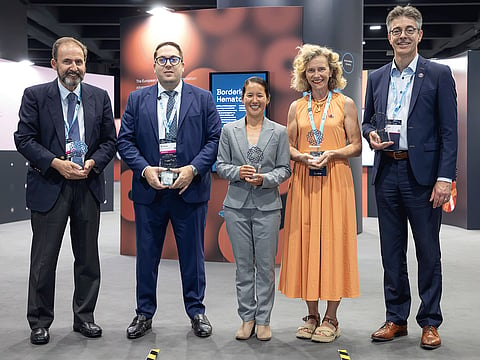UAE researcher wins prestigious EHA Clinical Excellence Award for contributions to Thalassemia
Professor Khaled Musallam becomes the first Arab to win the prestigious award

Abu Dhabi: A renowned name in rare blood disorders research, Prof. Khaled Musallam has become the first Arab to receive the Clinical Excellence Award from the European Hematology Association (EHA).
The award was given to him during EHA’s annual congress held in Milan, marking a historic moment for the scientific community in the Middle East.
His groundbreaking work in understanding and treating thalassemia, a genetic blood disorder, has reshaped global clinical paradigms in management and put the UAE at the forefront of hematology research.
The accolade recognizes Prof. Musallam’s extraordinary achievements and commitment to clinical research, with valuable contributions and pioneering work in the field.
His research has helped characterize the various forms of thalassemia with respect to transfusion dependence, leading to a shift in patient classification globally, better understanding of mechanisms of disease, and the development of novel disease-modifying therapies.
Transforming Global Understanding of Thalassemia
Prof. Musallam’s journey into thalassemia research began when he was a medical student at the American University of Beirut. Under the mentorship of Prof. Ali Taher, he published impactful research even before graduating, setting the tone for a prolific career.
He then embarked on a rapidly rising career in both academia and industry across multiple organizations in Europe and the Middle East. Now based at Burjeel Medical City in Abu Dhabi, he holds multiple positions, including Group Chief Research Officer at Burjeel Holdings, Director of the Thalassemia & Sickle Cell Center, and Founding Director of the Center for Research on Rare Blood Disorders (CR-RBD). He is also adjunct Professor at both Khalifa University in Abu Dhabi And Weill Cornell Medicine in New York.
Prof. Musallam has built extensive collaborations both regionally and globally and uses the power of observation to inform novel drug development.
“I don’t consider this award as just a recognition of my contributions to the field, it’s a celebration of all the successful collaborations I had throughout my career. The support and resources made available to me in the UAE over the past five years have surely helped accelerate my research programs and allowed me to put our region on the international map of research and development,” says Prof. Musallam.
His work has mainly focused on setting up and leading large global datasets of patients with thalassemia to identify relationships between modifiable risk factors and long-term morbidity and mortality outcomes, which can be targeted by treatment optimization or novel therapies.
His main work focused on the detrimental effects of untreated anemia in non-transfusion-dependent patients (NTDT), including serious complications and early death. His research also established clinical proof linking iron overload in these patients to severe multi-organ complications.
In the realm of transfusion-dependent thalassemia (TDT), Prof. Musallam has made various practice-changing contributions for treatment optimization and highlighted the protective role of fetal hemoglobin level, which supported advances in gene editing.
A New Therapeutic Landscape
By defining key iron thresholds in NTDT, Prof. Musallam’s work informed the design of trials for an oral iron chelation therapy, which led to its global approvals. More recently, his work on anemia in NTDT highlighted the unmet need that was the basis for the development of two novel disease-modifying therapies, luspatercept and mitapivat, the first ever to target the underlying disease in these patients.
The therapies were evaluated in global clinical trials with extensive involvement from Prof. Musallam as a principal investigator, steering committee member, and key advisor for regulatory filing with the US Food and Drug Administration and the European Medicines Agency. This body of work now forms the foundation of a new treatment landscape, bringing renewed hope to patients with this condition.
Legacy of Impact and Global Collaboration
Author of more than 230 publications in leading peer-reviewed international medical journals, with one of the highest citation records in the field, Prof. Musallam is also the editor of the first global NTDT management guidelines and the latest TDT management guidelines by the Thalassaemia International Federation. These documents are cornerstone references for physicians treating thalassemia worldwide.
Prof. Musallam’s recognition by EHA affirms his role as a transformative figure in hematology and underscores the UAE’s growing influence in global medical research. His work continues to inspire a new generation of clinicians and researchers determined to confront the challenges of rare and complex blood disorders.
Sign up for the Daily Briefing
Get the latest news and updates straight to your inbox

